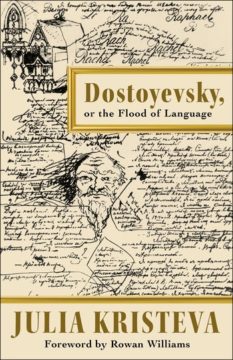Julia Kristeva at Bookforum:
 The initiated had been familiar with the first edition for a long time, but with this new one, Bakhtin’s Dostoyevsky became a social phenomenon, a political symptom. At the center of this new furor was my friend and mentor, Tzvetan Stoyanov, well-known literary critic, anglophone, francophone, and obviously russophone. He had already introduced me to Shakespeare and Joyce, Cervantes and Kafka, the Russian formalists and the breakthrough postformalism of a certain Bakhtin. Now we could reimmerse ourselves, day and night, out loud and in Russian, Bakhtin’s book in hand, in the novels of Dostoyevsky. I heard the vocal power of tragic laughter, the farce within the force of evil, and that contagious, drunken flow of dialogues composed as story that Bakhtin calls slovo, translated as mot (word) in French. Through the vocabulary and syntax, I heard, as Logos incarnate, the Word stirring biblical deliverance into a new multivocal, multiversal narration…
The initiated had been familiar with the first edition for a long time, but with this new one, Bakhtin’s Dostoyevsky became a social phenomenon, a political symptom. At the center of this new furor was my friend and mentor, Tzvetan Stoyanov, well-known literary critic, anglophone, francophone, and obviously russophone. He had already introduced me to Shakespeare and Joyce, Cervantes and Kafka, the Russian formalists and the breakthrough postformalism of a certain Bakhtin. Now we could reimmerse ourselves, day and night, out loud and in Russian, Bakhtin’s book in hand, in the novels of Dostoyevsky. I heard the vocal power of tragic laughter, the farce within the force of evil, and that contagious, drunken flow of dialogues composed as story that Bakhtin calls slovo, translated as mot (word) in French. Through the vocabulary and syntax, I heard, as Logos incarnate, the Word stirring biblical deliverance into a new multivocal, multiversal narration…
more here.
